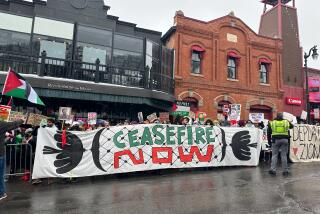Film festival in Baghdad garners positive reviews
- Share via
BAGHDAD — Armed guards frisked attendees at two separate checkpoints and foreign directors skipped the four-day event out of safety concerns.
But with its red carpet, half a dozen television crews circling like paparazzi and a roster of 58 films, the Baghdad International Film Festival is rolling on this week to a largely hipster Iraqi crowd enjoying its rare moment in the spotlight.
Organizers said they expect more than 1,000 movie fans, actors, directors and crew members to stop by the Palestine Hotel-turned-movie theater for the festival, the second since its inception in 2005.
The event marks a major departure from cinema during the era of Saddam Hussein, when independent moviemaking came to a standstill and 35-millimeter film stock was banned under international sanctions. The only locally produced movies then were government-sponsored. At the same time, there were more than a dozen theaters that featured family-friendly foreign films. Most have been bombed or closed since the 2003 U.S.-led invasion that drove Hussein from power; only three remain, screening B-grade action movies or skin flicks.
“The cinemas in Iraq have vanished; it is crippled,” said Malik Magtouf, 22, a student at Baghdad’s Institute of Management.
Although security concerns remain high, the event this week is a hopeful sign for Iraq’s young artists, including twentysomething guys sporting “fauxhawks” and women with uncovered heads in makeup and trendy jeans.
“When you watch and you hear the clicking sound of the movie projector, then you will feel that life has come back to Iraq,” said Yahya Allaq, 27, assistant director of “Ahlaam,” a film about the lives of three Iraqis during the Hussein regime.
Today, Iraq’s movie industry is reemerging, said aspiring actress Israa Bassam, 23, sporting pink lipstick and blond highlights in her long brown hair.
“Now, it’s better,” Bassam said, noting that there’s “new blood” making documentaries and feature films. The festival plans to dole out awards at a closing ceremony Saturday. Instead of Oscar-like statuettes, winning filmmakers will receive a trophy shaped like a date palm with film wrapped around its trunk.
Despite the hopeful outlook, none of the 31 foreign directors whose films were accepted into the festival traveled to Iraq. Representatives from the 27 Iraqi films attended.
And in an unrelated but grim reminder of the danger facing Iraqis, a well-known actor and television host, Khudair abu Abbas, was in critical condition Thursday after he was shot three times in the chest and arm while entering a factory in east Baghdad.
At the Palestine Hotel, logistical problems hobbled the festival. Power outages momentarily stopped movies and equipment failures delayed start times. The frigid indoor temperatures, even by American movie theater standards, forced people to stay bundled in their jackets and scarves.
But for filmmaker Allaq, those issues are nothing compared with the challenges the crew faced completing “Ahlaam,” a girl’s name that means “dreams” in Arabic.
During filming in 2004, crew members were kidnapped, beaten and threatened with execution by onetime supporters of Hussein, he said. One sound recorder was shot in the leg. In another incident during the 55-day film shoot, U.S. soldiers, suspecting that crew members belonged to Al Qaeda, interrogated and kept them in jail for four days until the Dutch Embassy helped negotiate their release.
The movie’s director, Mohamed Daradji, is working on another film about the crew’s experiences.
“My heart is strong now; it is solid,” Allaq said. “When you watch a film that you worked to achieve, you feel like a flying angel.”
Although foreign filmmakers did not attend, Iraqi director Thair Sahlani flew in from the Netherlands, where he has lived for the last 14 years. It is his first visit to Iraq since 2004.
“I was nervous,” Sahlani said. “It was kind of a challenge for me. But I like to see the festival here and the quality of the films. I see a lot of friends. We will be making movies again. I am sure of that.”
As the new filmmakers and actors embraced the future, members of an older generation said they were happy to pass the torch.
“We call for all the artistic side to have the initiative to produce and show new films,” said Aziz Kareem, a well-known Iraqi comedian from the 1980s. “It will be a resurrection of Iraqi cinema.”
--
Times staff writers Usama Redha and Saif Hameed in Baghdad contributed to this report.
More to Read
Only good movies
Get the Indie Focus newsletter, Mark Olsen's weekly guide to the world of cinema.
You may occasionally receive promotional content from the Los Angeles Times.











